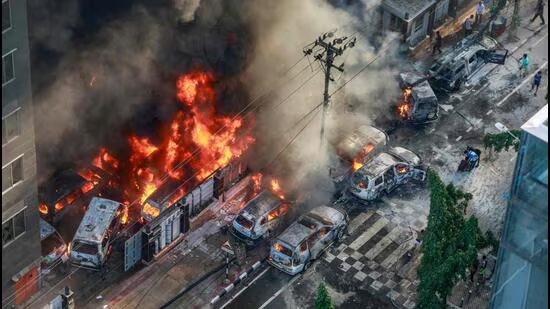Complete shutdown in Bangladesh as violent protests put PM Hasina in a spot of bother
People in Bangladesh woke up on Friday to a country completely shut down and virtually cut off from the outside world because of violent protests against a job quota, which left over 30 people dead and Prime Minister Sheikh Hasina facing her worst domestic crisis in decades.

The protests, largely spearheaded by students, had been building up for weeks after the high court reinstated in June a quota in highly sought government jobs for the children of veterans of the 1971 war of liberation from Pakistan. Violence flared in several cities of Bangladesh on Tuesday and the situation was exacerbated when students called a nationwide shutdown on Wednesday, a move backed by the opposition Bangladesh Nationalist Party (BNP).
On Thursday, protesters clashed with pro-government student groups and the police in Dhaka and many other places as videos emerged purportedly showing police vehicles driving into protestors in the capital city. While six people were killed earlier this week, the violence on Thursday reportedly claimed more than 20 lives.
With websites of leading English newspapers such as Daily Star and Dhaka Tribune, and even those of the foreign and home ministries, inaccessible, it has become increasingly difficult for the outside world to get credible information on the developments in Bangladesh, especially after the government blocked mobile internet and telecommunications services. Mobile phones and WhatsApp numbers within Bangladesh, which could be accessed till Thursday, were unreachable on Friday.
Though Prime Minister Hasina’s government had scrapped a job quota for the children of freedom fighters who participated in the 1971 war in October 2018, it was reinstated in June this year by the high court. The Supreme Court was set to hear petitions challenging the high court’s ruling on August 7, but will now take up the matter on Sunday following an urgent appeal from the government on Thursday.
Hasina, who began an unprecedented fifth term as prime minister in January after scoring a record fourth win in general elections, has long faced charges of giving undue advantages to supporters and workers of her Awami League party in virtually every wing of the government. Critics of the job quota, which reserves more than 50% of government jobs, have alleged that there is no verifiable list of veterans of the 1971 war and that the measure would largely benefit Awami League workers.
As in many other South Asian countries grappling with creating new avenues for employment, government jobs in Bangladesh are highly valued because of the salary and other benefits. The protesters have argued that the jobs should be awarded on merit and based on reservations that are perceived as skewed.
Hasina, who has also grappled with allegations of her government taking an increasingly authoritarian bent, has been blamed by some quarters for triggering the latest round of violent protests by her comments on the job quota during a news conference on Sunday.
When she was asked by a journalist about the opposition to the quota, the PM responded by asking whether jobs should be reserved for the children of freedom fighters or those of “razakars”, a derogatory term used in Bangladesh to refer to those who collaborated with Pakistan before and during the 1971 war. Some students participating in the protests have referred to themselves as “razakars”, reflecting the depth of their anger against the government.
India, which has invested billions of dollars in Bangladesh over the past decade to forge physical, trade and energy connectivity primarily aimed at boosting economic links between the northeastern and eastern regions and the neighbouring country, has already issued an advisory to its citizens in Bangladesh to avoid travel and remain indoors. New Delhi is keeping a close watch on the volatile situation to ensure the welfare of some 10,000 Indians, including about 7,000 students, who live in Bangladesh.
Hasina’s government has worked steadily for the economic development of Bangladesh, which is set to graduate out of the group of Least Developed Countries (LDCs) by 2026. But it is now increasingly common to hear both her well-wishers and critics say that Hasina needs to do more to relax her grip on power and create a viable space for the opposition, especially as her government has been accused of ramming through decisions without widespread consultations.
Disclaimer: The copyright of this article belongs to the original author. Reposting this article is solely for the purpose of information dissemination and does not constitute any investment advice. If there is any infringement, please contact us immediately. We will make corrections or deletions as necessary. Thank you.
Title:Complete shutdown in Bangladesh as violent protests put PM Hasina in a spot of bother
Url:https://www.investsfocus.com



